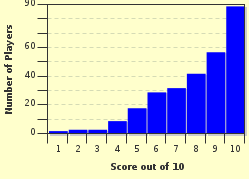Quiz Answer Key and Fun Facts
1. What language gives us coach, goulash, and paprika?
2. From where do we get sushi, karate, and geisha?
3. Sometimes pinning down a single language is difficult for certain words. Just identify the group of languages from which we get skunk, chipmunk, woodchuck, pecan, and Eskimo.
4. From what language do we get silk, tea, catsup, and tycoon?
5. If you know where to look to find a lama, yeti, or yak, you would probably know what language these words come from. What do you think?
6. You may know where we originally got the tomato, chocolate, avocado, and chili, but do you know the name of the language originally spoken there?
7. Here's another head-scratcher if you don't know the name of the language spoken in the place where quinine, condor, and coca originated.
8. Here's an interesting language. From it we get bizarre and jai alai. If you know what ethnic group gives us the game of jai alai, you know their language, perhaps Europe's oldest.
9. How about some more familiar words? From what language do we get almanac, admiral, mattress, alcohol, orange, and assassin?
10. How about one more exotic one? From what language do we get the words sarong, bamboo, and gingham?
Source: Author
shvdotr
This quiz was reviewed by FunTrivia editor
LadyCaitriona before going online.
Any errors found in FunTrivia content are routinely corrected through our feedback system.

